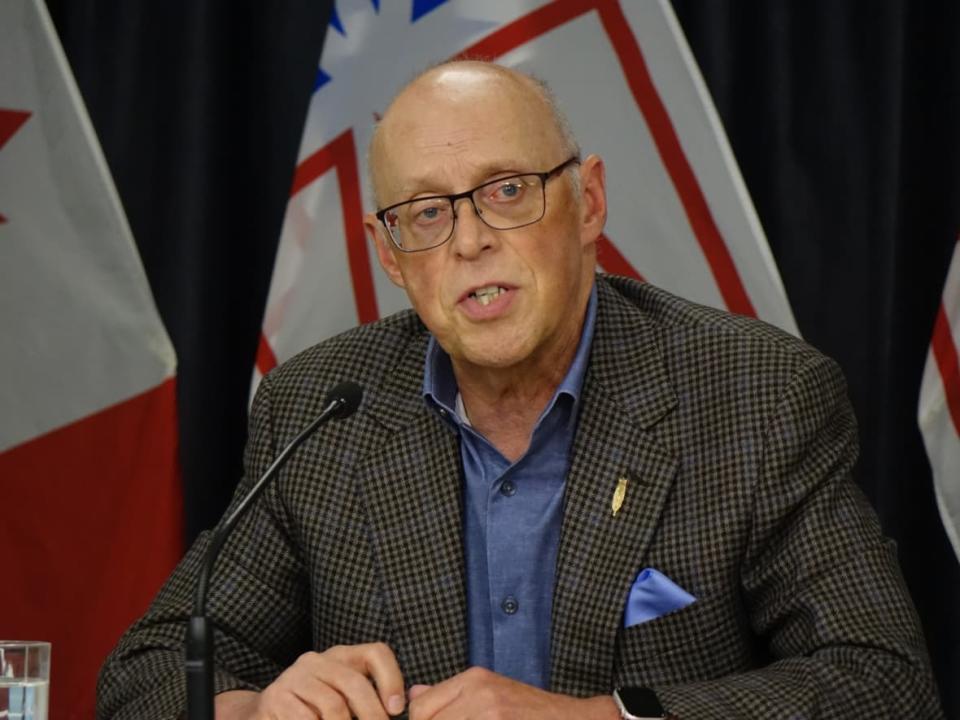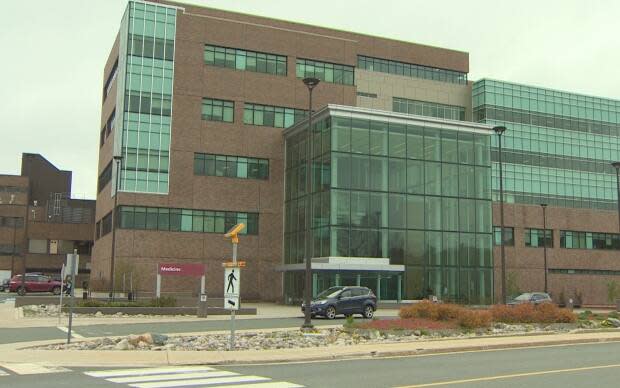Health Department unveils new measures to address family doctor shortage

Newfoundland and Labrador's Health Department is introducing a number of new measures meant to improve access to primary care and encourage family doctors to set up a practice in the province.
At a media conference Monday, Health Minister John Haggie said the measures are "just a start" to begin tackling the province's shortage of doctors.
"The issue is one of access, and that's what we're trying to fix in the immediate term. We have a major challenge with that, and that is where the pressure point is at the moment and that's where the thrust of this is to go down that road," he said.
According to the Newfoundland and Labrador Medical Association, nearly one in five people in the province don't have a family doctor, with the association now at odds with the province over a new contract for doctors and patients across the province struggling without accessible primary care.
Haggie said the Health Accord N.L. is examining ways to reimagine the health system to address those challenges, but with the group's final report not expected until early next year, something needed to be done in the short-term.
"In the meantime, we know that there are challenges that need to be addressed in short order," he said.
"These steps are simply an early foundation upon which the recommendations from the Health Accord will be built."
Haggie said the new initiatives, along with those announced last week for paramedicine, will cost more than $30 million a year.
In addition, $25 million will be spent to redevelop the emergency room at the Health Sciences Centre in St. John's to improve patient flow.
New collaborative team clinics
The first of the new measures is the opening of at least four new collaborative team clinics. The health minister said that will result in a "significant increase" in access to primary care in the St. John's area within about six weeks.
Haggie said the team-based approach at the new clinics get better health outcomes in patients, while creating better job satisfaction for health professionals.
"Patients will experience a different thing in metro [St. John's], something that rural has been used to for a long time. They will go to a health home and they will be seen by the most appropriate practitioner depending on their needs of the day," he said.
"That might be a nurse, it might be a nurse practitioner, could be a mental health and addictions counsellor, or it could be a family physician."
It's the right person, in the right place, at the right time. There are skill sets that each group brings that are invaluable. - Health Minister John Haggie
The approach won't affect the quality or continuity of care, according to Haggie, and by allowing health-care professionals to work to their full scope, each clinic should be able to handle at least 5,000 patients.
"I grew up in a household with many, many relatives, and this is a medical home, so if you're in need of care, you might not know whether it's your mum that's going to look after you or your granny, but you'll get the same level of care," he said.
"It's the right person, in the right place, at the right time. There are skill sets that each group brings that are invaluable."
'A health home' for those without one
Haggie said an existing collaborative team clinic on Mundy Pond Road in St. John's will move to a new space on Pippy Place, allowing the clinic to reopen its wait-list and take on about 1,200 new patients.
A new clinic will then fill the previous space on Mundy Pond Road, while a second new clinic will open on Topsail Road in St. John's. A new walk-in clinic will also be opening in the Mundy Pond Road space.
"They will provide improved patient access by, again, providing a health home for those people who do not currently have one," Haggie said.
He said Central Health and Western Health will also be supplementing care by opening a new collaborative team clinic in each of the regions by the end of March.
Haggie said it all helps to address the primary-care shortage.
"It does make a dent, because you're now going to have another one in Central and you're going to have one in Western.… These are all steps in the right direction. This is not the end of our actions, this is not the fix in its entirety; this is just the next step in building on what we already have," he said.
Attracting and retaining doctors
Another of the measures announced Monday is the issuing of a request for proposals for the development of a provincial health human resources plan.
Haggie said the plan will examine what motivates new doctors and find out what they're looking for in hopes of attracting them to Newfoundland and Labrador.
The province will also establish a health professional recruitment and retention office to bring in nurses, psychologists and pharmacists, in addition to physicians. Efforts will also be made to develop more local doctors and increase immigration of skilled health workers.

A new three-year pilot program will also be launched, Haggie said, that will guarantee income equivalent to that of a salaried family physician to new family doctors opening a family practice clinic or join an existing clinic for two years.
If a family physician establishes a roster of patients and provides after-hours service, and stays in the practice for five years, the government will pay $100,000.
"This will ease some of the uncertainties we've heard about the business aspects of opening a clinic, and it will do this by increasing their financial certainty," he said.
Virtual-care services will be increased, and a rural nursing program with remote teaching will be implemented, increasing the number of seats in the bachelor of science in nursing program by 25 per cent.
The nursing program will also be expanded to Happy Valley-Goose Bay, Gander, and Grand Falls-Windsor, beginning September 2022.
Haggie said the focus in Labrador will be mostly on recruitment and retention, as a different approach is needed due to geography.

 Yahoo Finance
Yahoo Finance 